Full Reviews
Full game reviews as we beat them, there will be a balance of both new and old games reviewed. We review the basics of the game and deliver scores in a few categories and an overall score out of 10.
999: Nine Hours, Nine Persons, Nine Doors
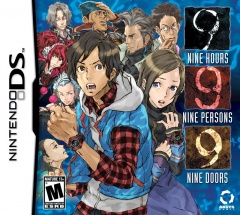 For the last few years, I’ve been attempting to answer the question “would I keep playing?” after finishing the first hour of a video game. It is kind of a loaded question, as I’m trying to answer for just myself, but also consider the millions of readers out there who might be wondering the same thing. I enjoy genres many people don’t, and I also have wildly varying opinions on a lot of games, so if I’m on the fence, I’ll generally give the game in question the thumbs up. In the end, the wording is important: I would keep playing if I had the time and energy to do so, but chances are I’m still chugging through Dragon Age: Origins.
For the last few years, I’ve been attempting to answer the question “would I keep playing?” after finishing the first hour of a video game. It is kind of a loaded question, as I’m trying to answer for just myself, but also consider the millions of readers out there who might be wondering the same thing. I enjoy genres many people don’t, and I also have wildly varying opinions on a lot of games, so if I’m on the fence, I’ll generally give the game in question the thumbs up. In the end, the wording is important: I would keep playing if I had the time and energy to do so, but chances are I’m still chugging through Dragon Age: Origins.After a half-hour with the Nintendo DS game 999: Nine Hours, Nine Persons, Nine Doors, I was emphatically done (we sometimes give portable games just the 30 minute treatment with the assumption that being a portable game, they might get things rolling quicker). It was a bizarre experience, to say the least. But then its fans started to comment. Commenters arrive in many forms, sometimes they’re offended that I seemingly insulted their game as if it was their mother, but sometimes they come as defenders of justice. 999 fans appeared as the latter.
So I gave the game another shot, replayed the beginning and on from there. I beat 999 three times in total to achieve the true ending, and in the end, I enjoyed my experience. My final score for the game was hard to pin down, so pay more attention to the text than the number.
Radiant Historia or: How I learned to enjoy Japanese RPGs again
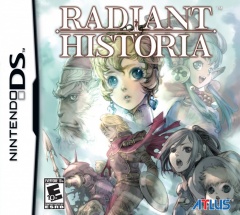 A year ago I vented how Persona 3 and Odin Sphere had destroyed my love for Japanese RPGs, one of my favorite video game genres growing up. I might have been a bit dramatic about the situation, but the two games left such bad tastes in my mouth I had to take a break from the genre. This lasted about six months before I ventured back into the land of turn-based rising sun with Sega’s Infinite Space, a game that has all the trappings of crappy JRPGs but turned out to be pretty great in the end.
A year ago I vented how Persona 3 and Odin Sphere had destroyed my love for Japanese RPGs, one of my favorite video game genres growing up. I might have been a bit dramatic about the situation, but the two games left such bad tastes in my mouth I had to take a break from the genre. This lasted about six months before I ventured back into the land of turn-based rising sun with Sega’s Infinite Space, a game that has all the trappings of crappy JRPGs but turned out to be pretty great in the end.Since then I’ve beaten Golden Sun 3: Dark Dawn, Black Sigil: Blade of the Exiled, and Radiant Historia. It’s been a mixed bag and a reminder that I’m not back in love with the genre, but one game in particular pretty much brought me back into the fold: Atlus’ newest Nintendo DS title, Radiant Historia.
Released in February, Radiant Historia chewed up more portable gaming time than anything I’ve played in recent memory. The idea that a 50 hour game should be imposing to someone with limited gaming time like myself didn’t matter, I plowed through it and the game was worth every minute. Here’s my review of Radiant Historia.
Nelson Tethers: Puzzle Agent
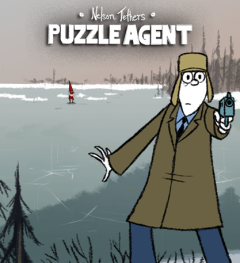 Nintendo has made a killing packaging classic pen-and-paper activities into DS games. Picross, Sudoku, Crosswords...but one of the major successes is the Professor Layton series. Developed by Level 5 and published by Nintendo outside of Japan, the franchise tasks players with solving puzzles and riddles in order to explore a storyline brimming with mystery. The puzzling travels of Professor Layton and his apprentice Luke are a hit with casuals and hardcore alike, selling over ten million units worldwide between the series' five titles.
Nintendo has made a killing packaging classic pen-and-paper activities into DS games. Picross, Sudoku, Crosswords...but one of the major successes is the Professor Layton series. Developed by Level 5 and published by Nintendo outside of Japan, the franchise tasks players with solving puzzles and riddles in order to explore a storyline brimming with mystery. The puzzling travels of Professor Layton and his apprentice Luke are a hit with casuals and hardcore alike, selling over ten million units worldwide between the series' five titles.
Of the three titles available outside Japan, I've only played the first, Curious Village. It's certainly full of cranium-crunching riddles, but I wasn't as taken by the rest of the package as many were. Decent production values aside, there wasn't much that impressed me from the strange story of Layton, Luke, and the peculiar villagers. I'd almost wished the game was a more sterile package, like so many other brainy DS productions. Most would probably disagree, seeing the worth in framing these teasers within a narrative.
Enter Nelson Tethers: Puzzle Agent. I bought this budget PC title in -- what else? -- a Steam bundle during the holiday season. Nelson clearly took notes from one of the Professor's lectures, because Puzzle Agent's premise is very similar to Curious Village, having the player explore a mysterious little town by solving riddles for its puzzle-obsessed populace. But unlike Curious Village, I actually enjoyed the overall experience even more than the puzzles that pervade it.Black Sigil: Blade of the Exiled
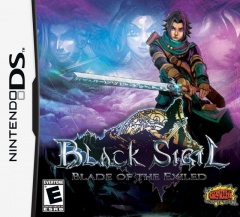 During the Super Nintendo era, Squaresoft was peaking with Secret of Mana, Final Fantasy VI, and Chrono Trigger. The developer defined the Japanese RPG genre with those titles and also completely owned the marketplace for years to come. It’s easily arguable that Square has since lost the JRPG title to other developers such as Atlus (with its recent bit of awesomeness titled Radiant Historia in particular), but they’ll never have their triumphant 16-bit period taken away from them.
During the Super Nintendo era, Squaresoft was peaking with Secret of Mana, Final Fantasy VI, and Chrono Trigger. The developer defined the Japanese RPG genre with those titles and also completely owned the marketplace for years to come. It’s easily arguable that Square has since lost the JRPG title to other developers such as Atlus (with its recent bit of awesomeness titled Radiant Historia in particular), but they’ll never have their triumphant 16-bit period taken away from them.Black Sigil: Blade of the Exiled is a love letter to that era. With sprites and animations seemingly ripped straight out of Chrono Trigger and Final Fantasy VI, and a story that sounds by-the-formula familiar to fans of the genre, this 2009 Nintendo DS release appears to be just another Japanese RPG title. But surprisingly, Black Sigil was developed in Montreal, so yes, this is one of those rare Canadian Japanese RPGs.
Developed by Studio Archcraft and published by Graffiti Entertainment, Black Sigil is also a bit of an indie title. The credits listed the same eight names over and over while the title was so long in development that it was originally targeted for the Game Boy Advance.
Unfortunately, the team had their goals so loftily set that I believe they lost sight of what made Squaresoft’s games so great: they were fun. Black Sigil is plagued by some major issues that most people will find the game unplayable beyond a few hours. I stuck it out though, and here’s my review.
Bionic Commando Rearmed 2
 One of my favorite activities in college was brainstorming ideas with my
roommates. When bored, we would gather in the living room, get out the
whiteboard, and come up with some imaginative business idea or a
get-rich-quick scheme or an outline of a blockbuster screenplay. The
ambitiousness of our outlandish dreams was matched only by our
enthusiasm to start making them a reality.
One of my favorite activities in college was brainstorming ideas with my
roommates. When bored, we would gather in the living room, get out the
whiteboard, and come up with some imaginative business idea or a
get-rich-quick scheme or an outline of a blockbuster screenplay. The
ambitiousness of our outlandish dreams was matched only by our
enthusiasm to start making them a reality.Then, after disagreeing for a few hours about what the title should be for our Atlantis-set romantic comedy, we'd give up and play Smash Bros. For the record, though, I still think "Mermaid for Each Other" is just brilliant.
I get the feeling that Fatshark, the small Swedish developer given the reigns to Bionic Commando after its previous steward was dissolved, had similarly lofty goals and equally tragic work ethic for the series' first 2-D sequel. The result is Bionic Commando Rearmed 2, a sequel that I suspect was conceived with a drive to do it big but produced with a reluctance to do it at all.
Mass Effect 2 (PS3)
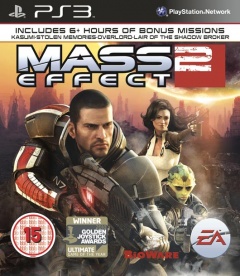 Some games are just so damn popular and beloved that you can't ignore them, no matter how hard you try.
Some games are just so damn popular and beloved that you can't ignore them, no matter how hard you try.When Mass Effect invaded my world in 2007, I couldn't have cared less. Sure, it was from the same BioWare that produced the excellent Knights of the Old Republic, and seducing blue women sounded like a pretty good time, but it definitely wasn't enough to put a 360 in my life. I'd grown weary of shooters of all kinds since burning out on Halo 2, and with RPG elements mashed in, it only seemed less enticing. I even gave the game a try last year on a friend's machine and didn't make it off the Citadel before losing interest.
The hype hasn't fallen on deaf ears, though. The rave reviews, rave first hour reviews, GOTY awards, and FOX News scare tactic hilarity all kept me up at night, wondering if I was missing out. EA was intent on making me give the series another shot, as they recently completed a PS3 port of Mass Effect 2. Because one of the series' bullet points is importing player-dictated narrative choices from the first game into the second, Dark Horse Comics was called in to help create a short interactive comic that fills in PS3 owners on some of the events that they missed out on from Commander Shepard's first adventure, even allowing the player to make some of the more important decisions to impact their experience with the full sequel.
As it turns out, that comic is DLC, unlockable either by a code included in the game's box or for $15. I rented the game and didn't plan on shelling out fifteen bucks for a fifteen minute comic, so I ended up going into the sequel without much knowledge from the first game. From that starting point aboard the exploding Normandy to the final trip through the Omega 4 relay, I've experienced just about everything included on the PS3 disc of Mass Effect 2 -- as much as you can in one playthrough, anyway -- as Elmer Shepard, a Vanguard of equal parts paragon and renegade, lover and fighter, savior and failure. And sometimes he forgets to feed his fish, and they die.
Greg has already written about the Mass Effect series extensively, having played both games and plenty of extra content on the 360. With that in mind, I'll try (but likely fail) to keep this brief. If you need a primer or refresher for the series, check out one of his excellent writeups. An avid fan of the series, he does a much better job of explaining the core elements of Mass Effect than I could.
Batman: Arkham Asylum
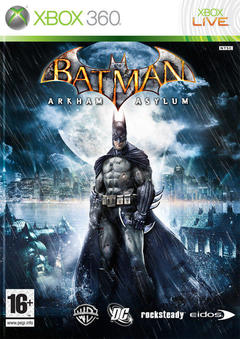 A year ago I played the first hour of Batman: Arkham Asylum. The conclusion was that I would keep playing “for a while,” and much of that decision rested on what percentage of the game would the stealth gameplay take up. I had to give the game back to who I was borrowing it from, however, and Arkham Asylum started burning a hole in my brain. I began to really want to play it again, but the opportunity never came up the rest of the year. When Christmas rolled around I said I wanted one game, and one game only: Batman.
A year ago I played the first hour of Batman: Arkham Asylum. The conclusion was that I would keep playing “for a while,” and much of that decision rested on what percentage of the game would the stealth gameplay take up. I had to give the game back to who I was borrowing it from, however, and Arkham Asylum started burning a hole in my brain. I began to really want to play it again, but the opportunity never came up the rest of the year. When Christmas rolled around I said I wanted one game, and one game only: Batman.I received the game but forced myself to beat Fable II before I moved on to something bigger and better (if I play more than one game at a time I’m bound to never play one of them again). The moment after I saved Albion again I switched over to Arkham Asylum and went to town.
Released in mid-2009, Arkham Asylum seemed to spring out of nowhere from absolute nobody Rocksteady Studios. Why and how these guys received the criminally under performing Batman license and then went out and made one of the best games of the year is a bit mind boggling, but a story for another day.
Here’s my full review of Batman: Arkham Asylum.
Ghost Trick: Phantom Detective
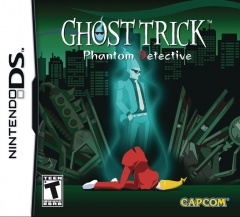 I've been anticipating Ghost Trick: Phantom Detective for a while now. As a big fan (but totally burned out) of the Ace Attorney series, I was excited for Phoenix Wright's creator's next vision. It's an odd one, that's for sure, but holds on to the humor, great cast of characters, and overwhelming charm that made the Ace Attorney series so great.
I've been anticipating Ghost Trick: Phantom Detective for a while now. As a big fan (but totally burned out) of the Ace Attorney series, I was excited for Phoenix Wright's creator's next vision. It's an odd one, that's for sure, but holds on to the humor, great cast of characters, and overwhelming charm that made the Ace Attorney series so great.In Ghost Trick, you unsurprisingly play as a ghost. The idea is you can manipulate objects from the ghostly dimension to save people's lives and ultimately, find out who you are and why you were killed. The Phoenix Wright-like mystery is present throughout the game and many of the questions aren't answered until the last action is taken, but it's a fun and original ride all the way there.
Phantom Detective shouldn't be a game that can be explained easily, but its first half-hour managed to do a pretty bang-up job. Check that out for an early walkthrough of all the concepts and in-depth gameplay elements the game explains to you quickly and efficiently.
Golden Sun: Dark Dawn
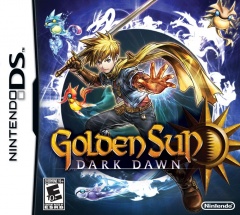 The Nintendo DS is easily the go-to console this generation when it comes to RPGs. As a developer, you'd be hard-pressed to have your title stand out in a library already rife with role-playing goodness. There are exceptions however, and Camelot's Golden Sun franchise is certainly one of them. The series' notoriety on the Game Boy Advance was enough to perk people's ears when Golden Sun: Dark Dawn was first announced. The sequel comes to us 7 years after the The Lost Age, with 30 years having passed in the game's universe. The original GBA games were hits. Does the sequel live up to the legacy they left behind?
The Nintendo DS is easily the go-to console this generation when it comes to RPGs. As a developer, you'd be hard-pressed to have your title stand out in a library already rife with role-playing goodness. There are exceptions however, and Camelot's Golden Sun franchise is certainly one of them. The series' notoriety on the Game Boy Advance was enough to perk people's ears when Golden Sun: Dark Dawn was first announced. The sequel comes to us 7 years after the The Lost Age, with 30 years having passed in the game's universe. The original GBA games were hits. Does the sequel live up to the legacy they left behind?If you take a glance at the beginning of my First Hour review, you'll see that I've listed what, I feel, makes a damn good Golden Sun game. I thought I'd keep this review simple and basically go through each of the points I already made and comment on what's changed and whats been added or subtracted from the core experience.
Magicka
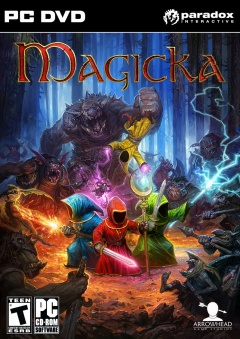 Indie games. I love indie games. Many are free, and those that aren't are usually still cheap enough to buy virtually regardless of your budget. Another reason I am a fan of the Indie market is that they're very good at listening to their fans. A great example is Mount and Blade: Warband. After the first game was introduced, fans wailed and screamed for multiplayer, and you know what? They got it. Mount and Blade: Warband features multiplayer that many people find sufficient, and if not, you can modify the game to hit your sweet spot.
Indie games. I love indie games. Many are free, and those that aren't are usually still cheap enough to buy virtually regardless of your budget. Another reason I am a fan of the Indie market is that they're very good at listening to their fans. A great example is Mount and Blade: Warband. After the first game was introduced, fans wailed and screamed for multiplayer, and you know what? They got it. Mount and Blade: Warband features multiplayer that many people find sufficient, and if not, you can modify the game to hit your sweet spot.But that isn't what I love most about indie games. No, no, no...I much prefer the fact that indie developers have much less to lose, so much more to gain and that means they push the envelope. Hell, they don't push it, they light the sucker on fire and piss on the ashes, developers Arrowhead Game Studios and publishers Paradox Interactive that is.
The game I'm talking about today is a fantastic example of a developer unleashed, and how fantastic it can truly be to see true geniuses able to work they way they want to. That result is Magicka, an action game based on Magic and its elements.
